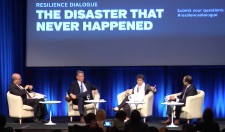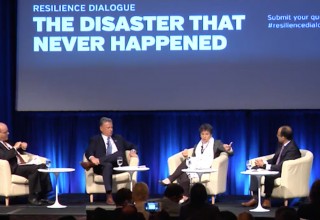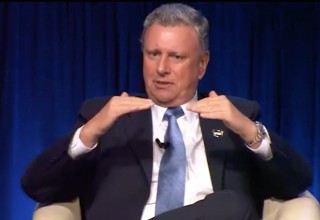The Path to Climate Mitigation Goes Through Resilience to Natural Hazards

MIAMI, October 16, 2017 (Newswire.com) - Resilience Action Fund (RAF) founder and construction industry veteran Aris Papadopoulos shared a panel with Paris Agreement champion Christiana Figueres during the World Bank’s annual meeting in Washington, D.C., on Oct.13, 2017. The day was the International Disaster Risk Reduction Day.
Following a year so far of escalating disasters in North America and around the globe, the panel’s topic was ‘The Disaster That Never Happened – How Resilient Infrastructure Will Save the World.’ The full discussion, including keynote remarks by Sir Richard Branson, can be viewed at http://live.worldbank.org/resilient-infrastructure.
Governments are often reluctant to be transparent with the public on hazard risk at the local level, for fear of affecting the property sector that is a major source of their tax revenue.
Aris Papadopoulos, Founding Chair, Resilience Action Fund
RAF’s founder stated that rebuilding again and again post-disaster has a major impact on resources, energy use and the environmental. Therefore environmental groups should embrace resilience to natural hazards as a pathway to achieving climate goals. He also noted that government weakness in land planning, placing infrastructure in high-risk locations and not being transparent with the public on the hazard vulnerabilities of communities and buildings were all impediments to achieving greater resilience.
Finally, he noted that we have distorted the concept of affordable homes and communities by accepting that affordability can be achieved by lowering resilience standards, which has an enormous cost to society. Instead, we need to ‘Make Resilience Affordable’ by raising standards and challenging innovation, progress down cost-curves and changing incentives in order to achieve affordability at higher resilience levels than what we have today.
RAF is a 501(c)(3) nonprofit organization, whose mission is to advance awareness, transparency and education for greater resilience in the built environment against natural and other hazards. The mission is closely aligned with the goals of the UN Sendai Framework for Disaster Risk Reduction: 2015-2030, signed in March 2015 by 187 countries. This milestone agreement is referenced in the COP21 Paris Agreement, which contained the strongest ever call for climate adaptation. RAF is also publisher of the recent book ‘Resilience: The Ultimate Sustainability – Lessons from Failing to Develop a Stronger and Safer Built Environment’ (available at www.buildingresilient.com).
For more information please contact resilienceaction1@gmail.com.
Source: Resilience Action Fund

